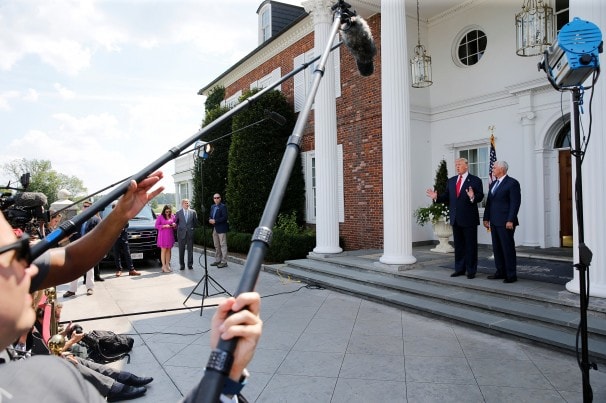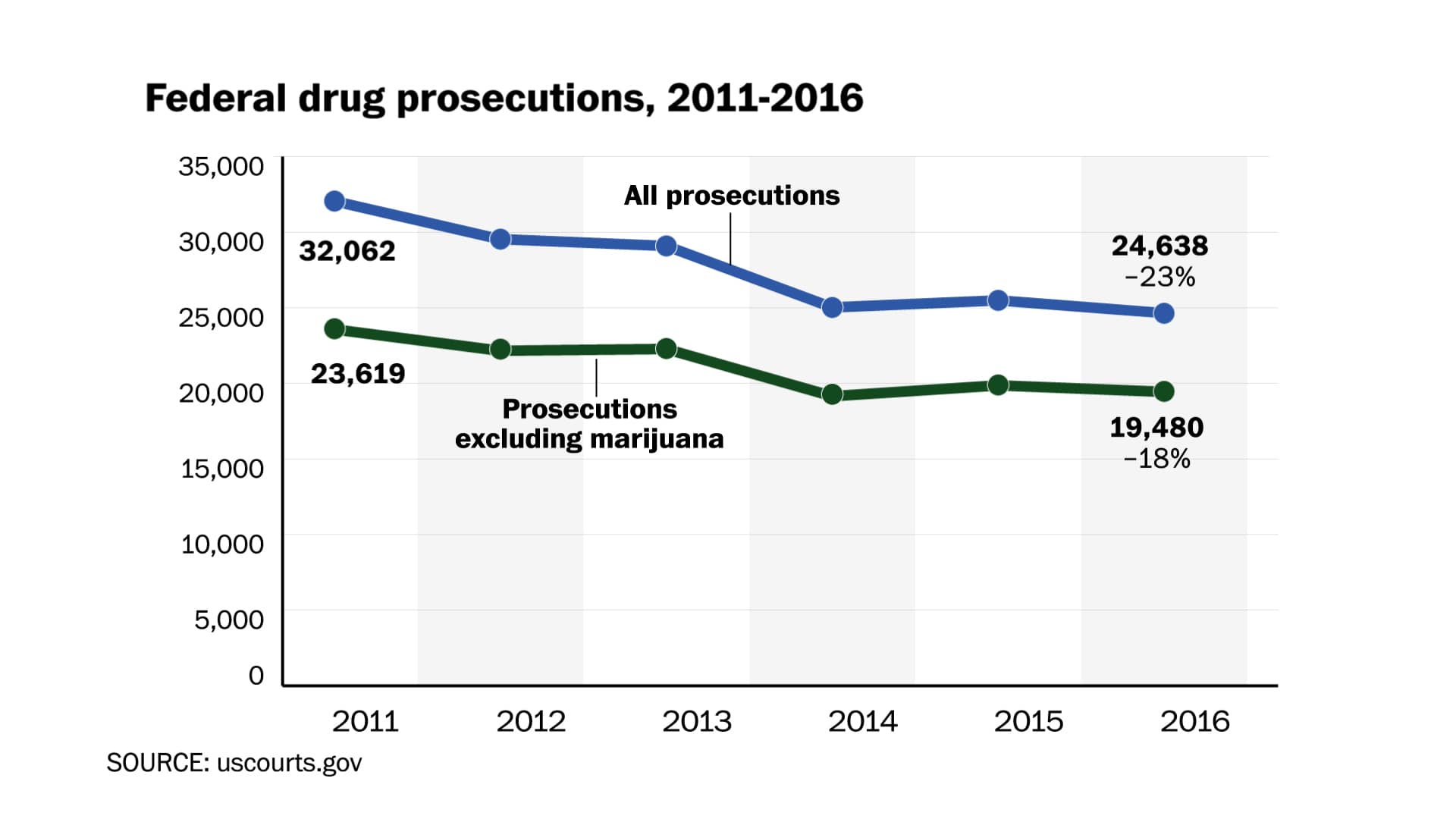“Federal drug prosecutions have gone down in recent years. We’re going to be bringing them up and bringing them up rapidly. At the end of 2016, there were 23 percent fewer than in 2011. So they looked at this scourge and they let it go by, and we’re not letting it go by.”
— President Trump, remarks before a briefing on the opioid epidemic, Aug. 8, 2017
President Trump — who two days after this briefing said he would declare the opioid epidemic to be a national emergency — not so subtly tried to pin the blame on the Obama administration. “They looked at this scourge and they let it go by,” the president said, citing statistics that federal drug prosecutions have declined 23 percent since 2011.
But there’s a problem: These stats don’t tell you much about opioids.
The Facts
The White House did not respond to a query, but the president appears to be referring to a March report by the Pew Research Center. That study showed that federal criminal prosecutions of all types reached a peak in 2011 and had fallen to the lowest level in two decades. As the president said, drug charges fell by 23 percent, with 24,638 defendants in fiscal 2016, compared with 32,062 in fiscal year 2011.
To fairly compare what happened under the Obama administration, we’d have to go back to 2008, President George W. Bush’s last year. From fiscal 2008 to 2016, drug prosecutions dropped 15 percent.
But these numbers are for all drug prosecutions — and the data does not break out opioid-related prosecutions. Instead, the data shows only two categories: marijuana and then all other drugs. Because marijuana was legalized in some states during President Barack Obama’s term, marijuana prosecutions fell 39 percent from 2011 to 2016. Without marijuana in the totals, the decline for drug prosecutions between 2011 and 2016 is 18 percent.
“In 2013, for example, after two states legalized the recreational use of marijuana, the department announced new charging priorities for offenses involving the drug, which remains illegal under federal law,” the Pew report noted. That same year, Pew noted, Attorney General Eric H. Holder Jr. announced a policy change that prosecutors make sure each case “serves a substantial federal interest,” a reason overall federal prosecutions may have fallen. Under the “Smart on Crime Initiative,” prosecutors were told to focus finite resources on more serious drug cases and leave low-level offenders to state prosecutors. (Many drug cases are handled in state courts, and there is even less data on that.)
“The data don’t specifically break out opioid prosecutions, so there’s no way to know what happened on that front,” said John Gramlich, who wrote the Pew report.
Trump’s statistic thus does not really tell you much about Obama’s handling of opioids. Our colleagues at FactCheck.org cited data from the U.S. Sentencing Commission — which shows how many people were actually sentenced for drug crimes — that indicates Trump is falsely attacking the former president.
Again, there are not good breakdowns for opioids. But there is data for heroin, which shows the number of people who were sentenced for federal heroin offenses rose by 56 percent from fiscal 2011 to 2016. Separately, the number of people convicted of trafficking in oxycodone rose sharply from 2008 to 2014, before falling in 2015 and 2016. But there isn’t data on other crimes involving oxycodone, hydrocodone or fentanyl.
Obama’s handling of the crisis is certainly open to criticism. If Trump wanted to be specific, he could have cited a Washington Post investigation that showed the Drug Enforcement Administration, under pressure from drug companies, softened enforcement of wholesale companies that distributed pills to the corrupt pharmacies that illegally sold the drugs for street use.
The jury is still out on whether Trump can improve on Obama’s numbers. In a report released July 27, the Transactional Records Access Clearinghouse (TRAC) at Syracuse University said that drug prosecutions have continued to decline during the first five months of the Trump administration, so that “fewer drug offenders were federally prosecuted over the past 12 months than at any time during the last quarter century.”
The Pinocchio Test
This is a good example of data being used incorrectly. Federal prosecutions have gone down since 2011, but that does not indicate that the Obama administration ignored the opioid epidemic. The number cited by Trump was the result of a decline in marijuana prosecutions and a change in policy to focus on bigger, more important cases. Moreover, there is not enough detail in the data to show whether opioid prosecutions declined, as Trump suggested.
Two Pinocchios


Send us facts to check by filling out this form
Keep tabs on Trump’s promises with our Trump Promise Tracker
Sign up for The Fact Checker weekly newsletter
Do you rate this claim as true or false? More Pinocchios for false, fewer based on your opinion of the statement’s truthfulness. (The check mark means you think the statement is true, not that you agree with the rating.)
Pardon the interruption!
We need to verify that you are an actual person.
This is a non-scientific user poll. Results are not statistically valid and cannot be assumed to reflect the views of Washington Post users as a group or the general population.

 Washington Post Rating:
Washington Post Rating: 
